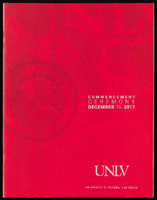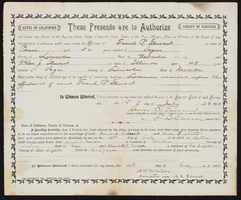Search the Special Collections and Archives Portal
Search Results
Kenneth Giles Professional Papers
Identifier
Abstract
The Kenneth Giles Professional Papers (1964-2001) contain documents and visual material related to Giles's time as an Environmental Radiation Monitor for the Environmental Protection Agency (EPA) at the Nevada Test Site (NTS). Photographic slides, film, and digital images depict the general flora and fauna throughout the area surrounding the NTS. Visual materials also document specific mule deer and steer surveillance and testing at the EPA Farm located within the NTS. The collection also contains environmental reports written or collected by Giles, government documents, pamphlets, and newspaper clippings related to environmental monitoring and Giles's work at NTS. A small portion of the collection documents his brief role providing monitoring support at Three Mile Island in Pennsylvania in 1979. Note: Some images may be of a graphic or disturbing nature and may not be suitable for some users. Photographs may contain scenes of animal testing or other objectionable imagery.
Archival Collection
Scott Henry Photographs of the Las Vegas, Nevada Latinx Community
Identifier
Abstract
The Scott Henry Photographs of the Las Vegas, Latinx Community (approximately 1983-2000) consist of 42 photographic prints depicting members of the Latinx community in Las Vegas, Nevada. Thirty-eight of the prints were used as part of a collaborative project between Scott Henry, photographer and editor for the Las Vegas Review-Journal, and Thomas Rodriguez, a prominent member of the Latinx community in Las Vegas, for an exhibit of the Las Vegas Latinx community. Henry and Rodriguez together planned who to photograph for the exhibit. The photographs demonstrate the impact that the Latinx community has on the region's political, economic, and social growth and development. A number of the photographs show early members of the League of United Latin American Citizens (LULAC), including John Mendoza, Delia Martinez, Tom Rodriguez, Bob Agonia, Corrine Gutierrez, Nick Flores, Grace Salazar, and Gus Ramos.
Archival Collection
Donna Andress Papers
Identifier
Abstract
The Donna Andress Papers (1890-2021) contain the personal papers of Donna Andress, a longtime resident and activist in Southern Nevada. Materials include correspondence and newspaper clippings from the Nevada Welfare Committee, on which Andress served as chairperson during the 1970s, in addition to pamphlets and newsletters from various Nevada historical organizations and committees. The papers reflect her involvement with community organizations throughout Southern Nevada.
Archival Collection
Marjorie Barrick Museum of Natural History Records
Identifier
Abstract
The Marjorie Barrick Museum of Natural History Records (1939-2003) detail the creation of the Marjorie Barrick Museum of Natural History in Las Vegas, Nevada founded by Richard H. Brooks, a professor of anthropology at the University of Nevada, Las Vegas. The records are comprised primarily of correspondence between Brooks and members of the Southwestern Anthropological Association (SWAA), the Society for California Archaeology (SCA), and the meetings and exhibitions of the Nevada State Museum. The collection also contains financial statements that describe expenses for supplies, research, and excursions. Also included are anthropological, archaeological, and historical publications, as well as administrative files and Richard Brooks' correspondence with the Nevada Archaeological Survey (NAS). The collection also includes architectural floor plans for the Classroom and Physical Education, the original space that was converted into the museum in 1980, and plans for the redesign of the Barrick Museum and the Harry Reid Environmental Research Center addition.
Archival Collection

University of Nevada, Las Vegas (UNLV) Fall 2017 commencement program
Date
Archival Collection
Description
Commencement program from University of Nevada, Las Vegas Commencement Programs and Graduation Lists (UA-00115).
Text

Marie Antoinette Antonio oral history interview: transcript
Date
Archival Collection
Description
Oral history interview with Marie Antoinette Antonio conducted by Cecilia Winchell and Stefani Evans on December 4, 2021 for Reflections: The Las Vegas Asian American and Pacific Islander Oral History Project. Marie reflects on her upbringing in Cagayan de Oro, Philippines and her love of music that came from her mother. Marie talks about studying music in college and traveling with her husband to Guam to become a music teacher at a Catholic school before immigrating to San Jose, California. She shares the culture shock they faced adapting to life in the United States and the higher cost of living in California, which caused the couple to move to Las Vegas. Marie discusses her life in Las Vegas, traditions and cultural celebrations she partakes in, and the American Dream.
Text

Junior Fonotisatele oral history interview: transcript
Date
Archival Collection
Description
Oral history interview with Junior Fonotisatele conducted by Cecilia Winchell and Stefani Evans on November 10, 2021 for Reflections: The Las Vegas Asian American and Pacific Islander Oral History Project. Junior discusses his Samoan background and the importance of strong family values. He talks about his early years in Utah and California before moving to Las Vegas where he attended and graduated from the University of Nevada, Las Vegas. Junior shares his employment history as a bodyguard for Floyd Mayweather, an entrepreneur of a clothing brand, and an investor into a range of ventures including security, solar energy, and mental health. He concludes with a discussion of Samoan cultural celebrations, his religion, and the significance of his tattoos.
Text
Steve Sisolak (Nevada Governor) oral history interview conducted by Magdalena Martinez: transcript
Date
Archival Collection
Description
From the Lincy Institute "Perspectives from the COVID-19 Pandemic" Oral History Project (MS-01178) -- Elected official interviews file.
Text

Marriage certificate of Helen and Frank Stewart and Tiza Stewart land patents
Date
Archival Collection
Description
Marriage certificate of Helen and Frank Stewart and Tiza Stewart land patents
Text

Anita Tijerina Revilla oral history interview: transcript
Date
Archival Collection
Description
Oral history interview with Anita Tijerina Revilla conducted by Marcela Rodriguez-Campo on October 09, 2018 for the Latinx Voices of Southern Nevada Oral History Project. In this interview, Revilla discusses her early life in San Antonio, Texas. She talks about her decision to make education a priority, figuring out the college application process on her own, and her initial interest in social justice. Revilla talks about how her critical consciousness was developed, and her pedagogical approach to teaching. Revilla describes her role in the 2006 May Day march, advocating advocating for the queer community, and disrupting oppressive systems to increase educational access for students. Lastly, Revilla discusses ethnic studies and the history of inequality in the United States.
Text
